Entrepreneurship & Small Business Management: UK Economic Impact
VerifiedAdded on 2020/10/22
|13
|4066
|188
Report
AI Summary
This report provides a comprehensive analysis of entrepreneurship and small business management, focusing on their impact on the UK economy. It examines various types of entrepreneurial ventures, including serial entrepreneurship, owner-management, and typologies like lifestyle, growth, and social entrepreneurship. The report highlights the similarities and differences between these ventures and assesses the impact of small businesses on the economy, emphasizing their role in job creation and innovation. It further explores the importance of small businesses and start-ups to the growth of the UK economy, considering factors like innovation, competition, and employment. The report also delves into the characteristics, traits, and skills of successful entrepreneurs and analyzes how background and experience can either foster or hinder entrepreneurship, using examples like Walt Disney and Henry Ford to illustrate these points. The report concludes by summarizing the key findings and emphasizing the vital role of entrepreneurship and small businesses in driving economic growth and innovation in the UK.
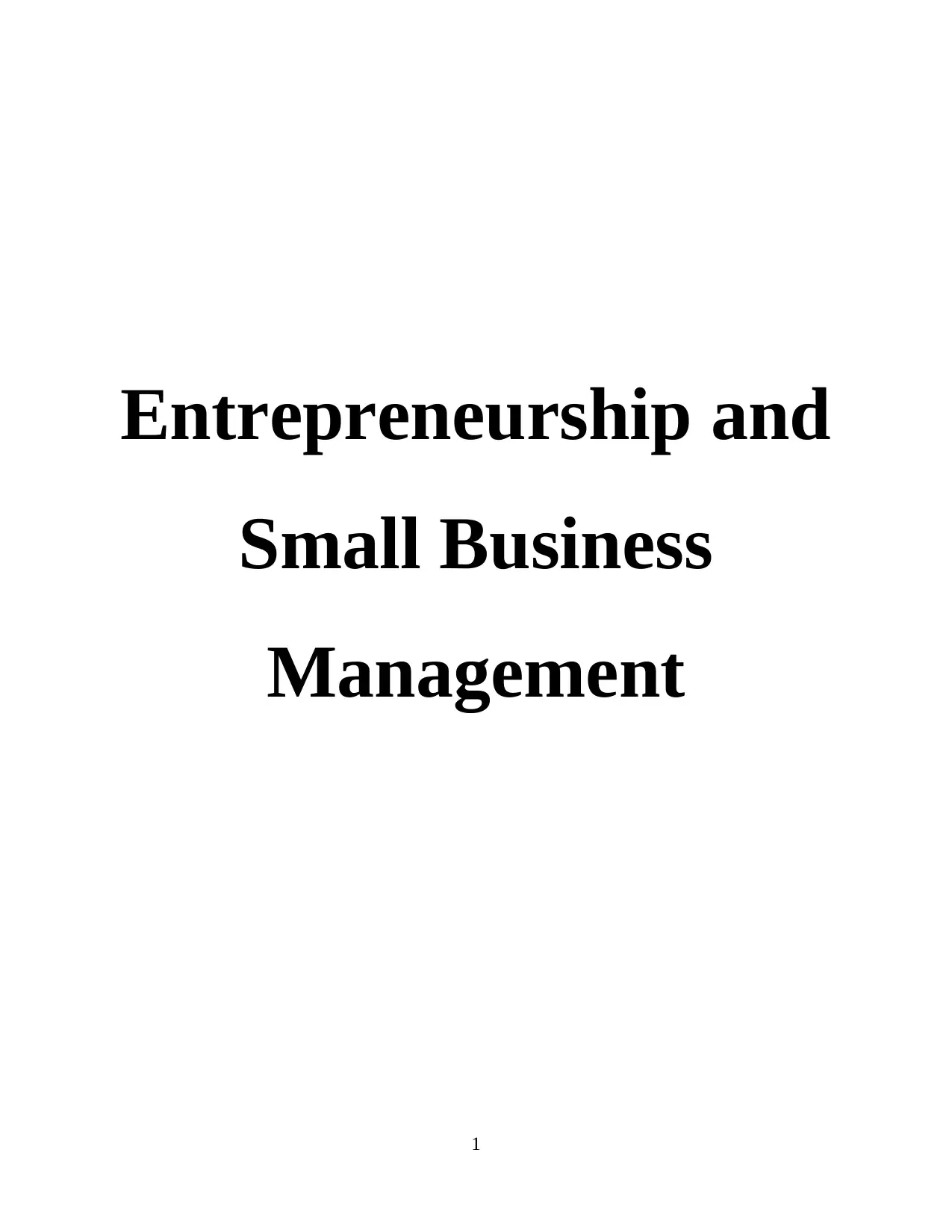
Entrepreneurship and
Small Business
Management
1
Small Business
Management
1
Paraphrase This Document
Need a fresh take? Get an instant paraphrase of this document with our AI Paraphraser
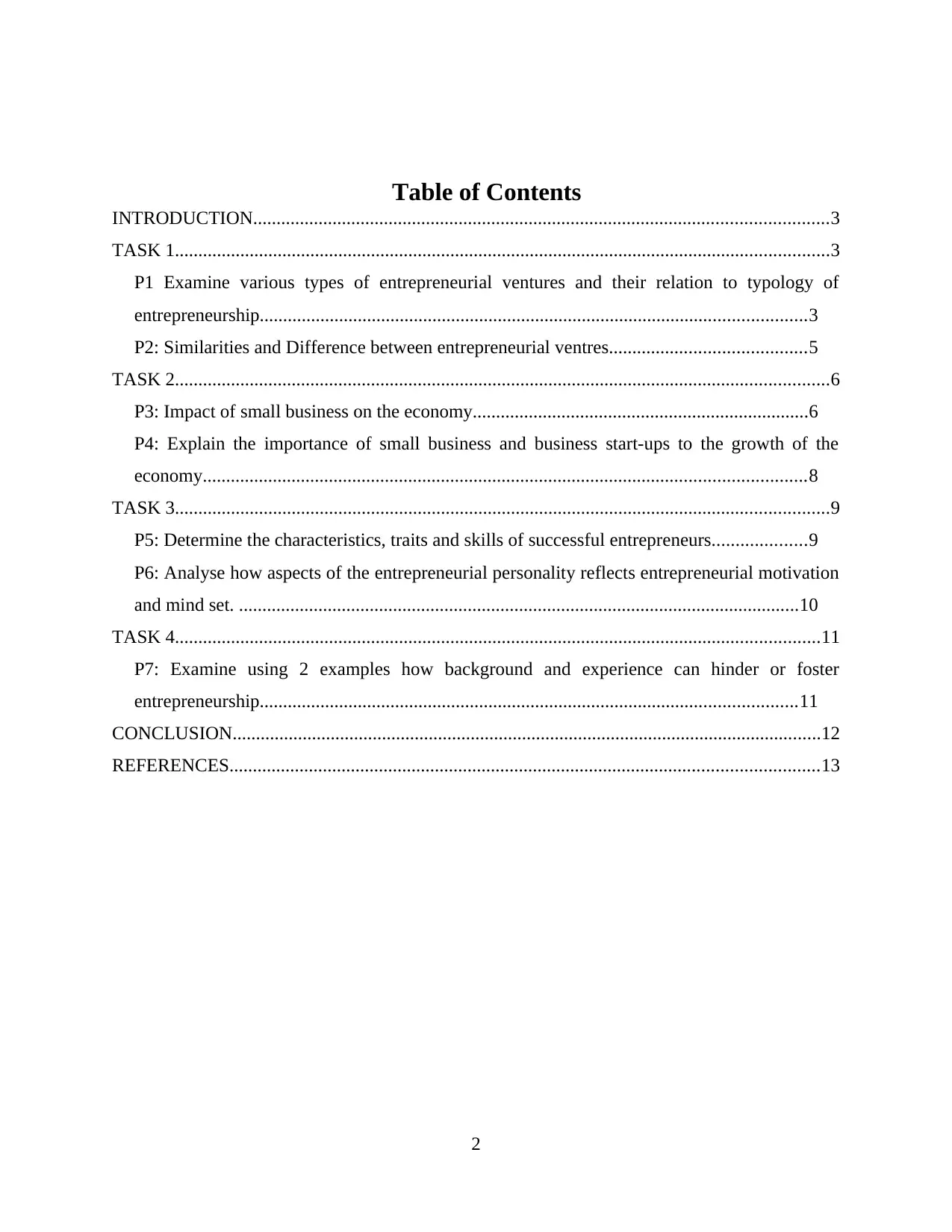
Table of Contents
INTRODUCTION...........................................................................................................................3
TASK 1............................................................................................................................................3
P1 Examine various types of entrepreneurial ventures and their relation to typology of
entrepreneurship.....................................................................................................................3
P2: Similarities and Difference between entrepreneurial ventres..........................................5
TASK 2............................................................................................................................................6
P3: Impact of small business on the economy........................................................................6
P4: Explain the importance of small business and business start-ups to the growth of the
economy.................................................................................................................................8
TASK 3............................................................................................................................................9
P5: Determine the characteristics, traits and skills of successful entrepreneurs....................9
P6: Analyse how aspects of the entrepreneurial personality reflects entrepreneurial motivation
and mind set. ........................................................................................................................10
TASK 4..........................................................................................................................................11
P7: Examine using 2 examples how background and experience can hinder or foster
entrepreneurship...................................................................................................................11
CONCLUSION..............................................................................................................................12
REFERENCES..............................................................................................................................13
2
INTRODUCTION...........................................................................................................................3
TASK 1............................................................................................................................................3
P1 Examine various types of entrepreneurial ventures and their relation to typology of
entrepreneurship.....................................................................................................................3
P2: Similarities and Difference between entrepreneurial ventres..........................................5
TASK 2............................................................................................................................................6
P3: Impact of small business on the economy........................................................................6
P4: Explain the importance of small business and business start-ups to the growth of the
economy.................................................................................................................................8
TASK 3............................................................................................................................................9
P5: Determine the characteristics, traits and skills of successful entrepreneurs....................9
P6: Analyse how aspects of the entrepreneurial personality reflects entrepreneurial motivation
and mind set. ........................................................................................................................10
TASK 4..........................................................................................................................................11
P7: Examine using 2 examples how background and experience can hinder or foster
entrepreneurship...................................................................................................................11
CONCLUSION..............................................................................................................................12
REFERENCES..............................................................................................................................13
2
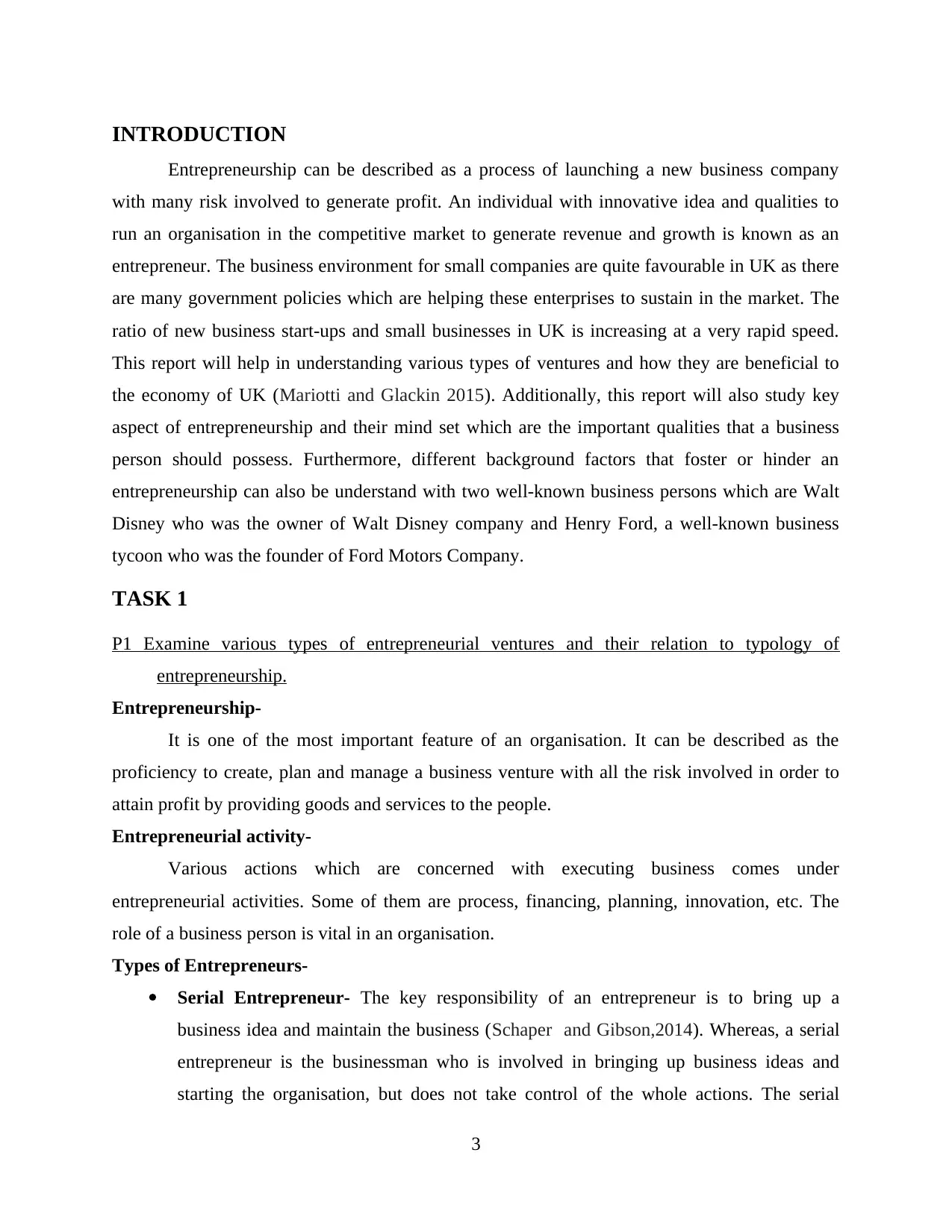
INTRODUCTION
Entrepreneurship can be described as a process of launching a new business company
with many risk involved to generate profit. An individual with innovative idea and qualities to
run an organisation in the competitive market to generate revenue and growth is known as an
entrepreneur. The business environment for small companies are quite favourable in UK as there
are many government policies which are helping these enterprises to sustain in the market. The
ratio of new business start-ups and small businesses in UK is increasing at a very rapid speed.
This report will help in understanding various types of ventures and how they are beneficial to
the economy of UK (Mariotti and Glackin 2015). Additionally, this report will also study key
aspect of entrepreneurship and their mind set which are the important qualities that a business
person should possess. Furthermore, different background factors that foster or hinder an
entrepreneurship can also be understand with two well-known business persons which are Walt
Disney who was the owner of Walt Disney company and Henry Ford, a well-known business
tycoon who was the founder of Ford Motors Company.
TASK 1
P1 Examine various types of entrepreneurial ventures and their relation to typology of
entrepreneurship.
Entrepreneurship-
It is one of the most important feature of an organisation. It can be described as the
proficiency to create, plan and manage a business venture with all the risk involved in order to
attain profit by providing goods and services to the people.
Entrepreneurial activity-
Various actions which are concerned with executing business comes under
entrepreneurial activities. Some of them are process, financing, planning, innovation, etc. The
role of a business person is vital in an organisation.
Types of Entrepreneurs-
Serial Entrepreneur- The key responsibility of an entrepreneur is to bring up a
business idea and maintain the business (Schaper and Gibson,2014). Whereas, a serial
entrepreneur is the businessman who is involved in bringing up business ideas and
starting the organisation, but does not take control of the whole actions. The serial
3
Entrepreneurship can be described as a process of launching a new business company
with many risk involved to generate profit. An individual with innovative idea and qualities to
run an organisation in the competitive market to generate revenue and growth is known as an
entrepreneur. The business environment for small companies are quite favourable in UK as there
are many government policies which are helping these enterprises to sustain in the market. The
ratio of new business start-ups and small businesses in UK is increasing at a very rapid speed.
This report will help in understanding various types of ventures and how they are beneficial to
the economy of UK (Mariotti and Glackin 2015). Additionally, this report will also study key
aspect of entrepreneurship and their mind set which are the important qualities that a business
person should possess. Furthermore, different background factors that foster or hinder an
entrepreneurship can also be understand with two well-known business persons which are Walt
Disney who was the owner of Walt Disney company and Henry Ford, a well-known business
tycoon who was the founder of Ford Motors Company.
TASK 1
P1 Examine various types of entrepreneurial ventures and their relation to typology of
entrepreneurship.
Entrepreneurship-
It is one of the most important feature of an organisation. It can be described as the
proficiency to create, plan and manage a business venture with all the risk involved in order to
attain profit by providing goods and services to the people.
Entrepreneurial activity-
Various actions which are concerned with executing business comes under
entrepreneurial activities. Some of them are process, financing, planning, innovation, etc. The
role of a business person is vital in an organisation.
Types of Entrepreneurs-
Serial Entrepreneur- The key responsibility of an entrepreneur is to bring up a
business idea and maintain the business (Schaper and Gibson,2014). Whereas, a serial
entrepreneur is the businessman who is involved in bringing up business ideas and
starting the organisation, but does not take control of the whole actions. The serial
3
⊘ This is a preview!⊘
Do you want full access?
Subscribe today to unlock all pages.

Trusted by 1+ million students worldwide
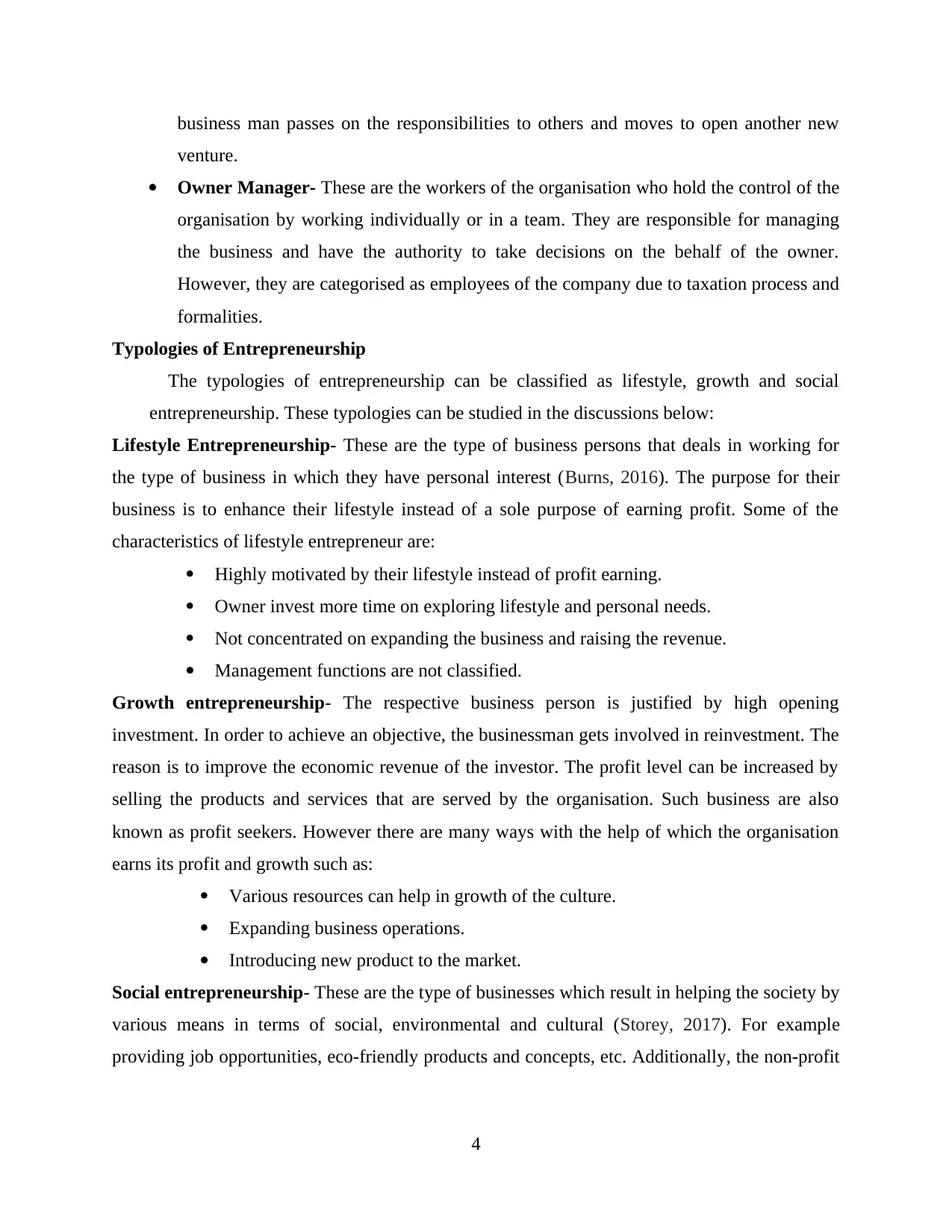
business man passes on the responsibilities to others and moves to open another new
venture.
Owner Manager- These are the workers of the organisation who hold the control of the
organisation by working individually or in a team. They are responsible for managing
the business and have the authority to take decisions on the behalf of the owner.
However, they are categorised as employees of the company due to taxation process and
formalities.
Typologies of Entrepreneurship
The typologies of entrepreneurship can be classified as lifestyle, growth and social
entrepreneurship. These typologies can be studied in the discussions below:
Lifestyle Entrepreneurship- These are the type of business persons that deals in working for
the type of business in which they have personal interest (Burns, 2016). The purpose for their
business is to enhance their lifestyle instead of a sole purpose of earning profit. Some of the
characteristics of lifestyle entrepreneur are:
Highly motivated by their lifestyle instead of profit earning.
Owner invest more time on exploring lifestyle and personal needs.
Not concentrated on expanding the business and raising the revenue.
Management functions are not classified.
Growth entrepreneurship- The respective business person is justified by high opening
investment. In order to achieve an objective, the businessman gets involved in reinvestment. The
reason is to improve the economic revenue of the investor. The profit level can be increased by
selling the products and services that are served by the organisation. Such business are also
known as profit seekers. However there are many ways with the help of which the organisation
earns its profit and growth such as:
Various resources can help in growth of the culture.
Expanding business operations.
Introducing new product to the market.
Social entrepreneurship- These are the type of businesses which result in helping the society by
various means in terms of social, environmental and cultural (Storey, 2017). For example
providing job opportunities, eco-friendly products and concepts, etc. Additionally, the non-profit
4
venture.
Owner Manager- These are the workers of the organisation who hold the control of the
organisation by working individually or in a team. They are responsible for managing
the business and have the authority to take decisions on the behalf of the owner.
However, they are categorised as employees of the company due to taxation process and
formalities.
Typologies of Entrepreneurship
The typologies of entrepreneurship can be classified as lifestyle, growth and social
entrepreneurship. These typologies can be studied in the discussions below:
Lifestyle Entrepreneurship- These are the type of business persons that deals in working for
the type of business in which they have personal interest (Burns, 2016). The purpose for their
business is to enhance their lifestyle instead of a sole purpose of earning profit. Some of the
characteristics of lifestyle entrepreneur are:
Highly motivated by their lifestyle instead of profit earning.
Owner invest more time on exploring lifestyle and personal needs.
Not concentrated on expanding the business and raising the revenue.
Management functions are not classified.
Growth entrepreneurship- The respective business person is justified by high opening
investment. In order to achieve an objective, the businessman gets involved in reinvestment. The
reason is to improve the economic revenue of the investor. The profit level can be increased by
selling the products and services that are served by the organisation. Such business are also
known as profit seekers. However there are many ways with the help of which the organisation
earns its profit and growth such as:
Various resources can help in growth of the culture.
Expanding business operations.
Introducing new product to the market.
Social entrepreneurship- These are the type of businesses which result in helping the society by
various means in terms of social, environmental and cultural (Storey, 2017). For example
providing job opportunities, eco-friendly products and concepts, etc. Additionally, the non-profit
4
Paraphrase This Document
Need a fresh take? Get an instant paraphrase of this document with our AI Paraphraser
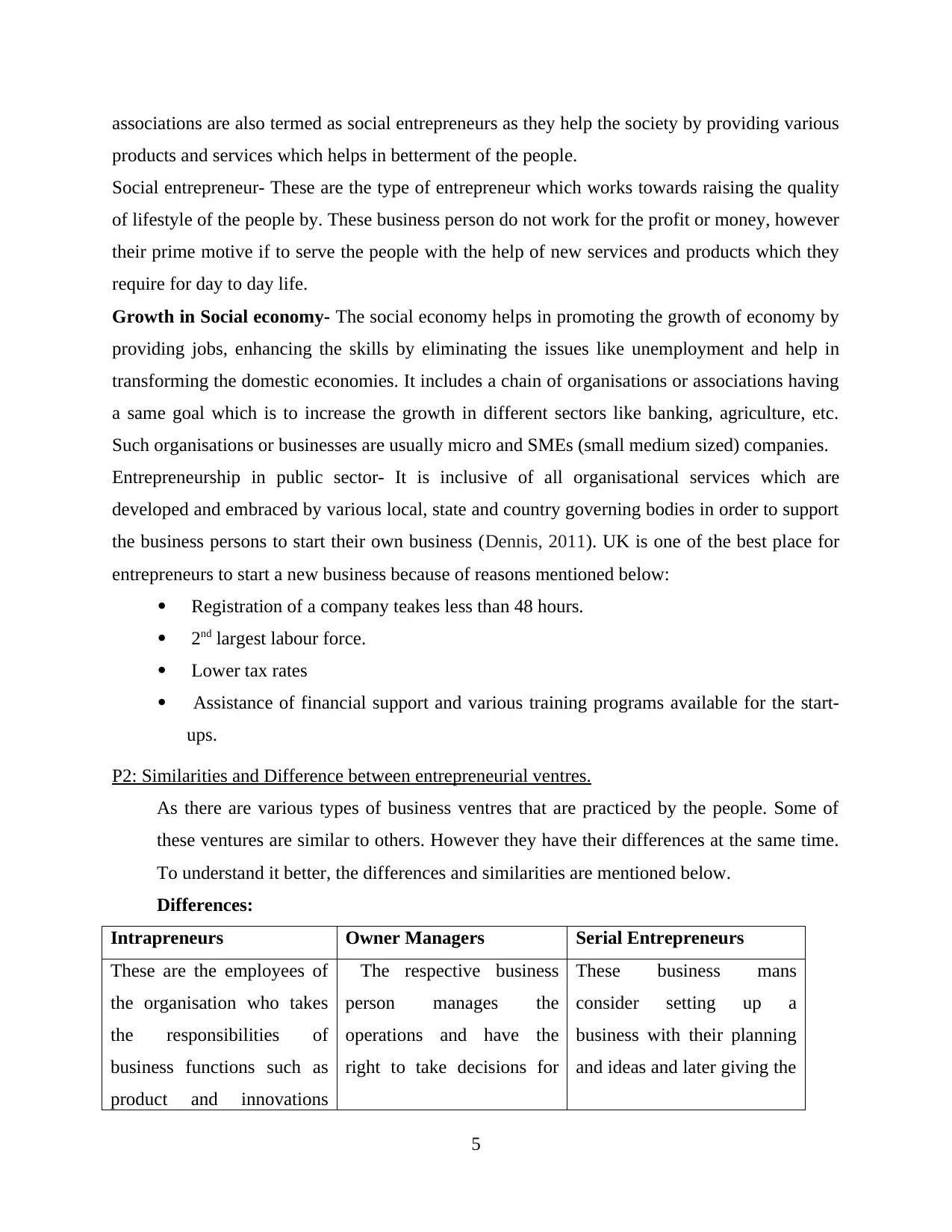
associations are also termed as social entrepreneurs as they help the society by providing various
products and services which helps in betterment of the people.
Social entrepreneur- These are the type of entrepreneur which works towards raising the quality
of lifestyle of the people by. These business person do not work for the profit or money, however
their prime motive if to serve the people with the help of new services and products which they
require for day to day life.
Growth in Social economy- The social economy helps in promoting the growth of economy by
providing jobs, enhancing the skills by eliminating the issues like unemployment and help in
transforming the domestic economies. It includes a chain of organisations or associations having
a same goal which is to increase the growth in different sectors like banking, agriculture, etc.
Such organisations or businesses are usually micro and SMEs (small medium sized) companies.
Entrepreneurship in public sector- It is inclusive of all organisational services which are
developed and embraced by various local, state and country governing bodies in order to support
the business persons to start their own business (Dennis, 2011). UK is one of the best place for
entrepreneurs to start a new business because of reasons mentioned below:
Registration of a company teakes less than 48 hours.
2nd largest labour force.
Lower tax rates
Assistance of financial support and various training programs available for the start-
ups.
P2: Similarities and Difference between entrepreneurial ventres.
As there are various types of business ventres that are practiced by the people. Some of
these ventures are similar to others. However they have their differences at the same time.
To understand it better, the differences and similarities are mentioned below.
Differences:
Intrapreneurs Owner Managers Serial Entrepreneurs
These are the employees of
the organisation who takes
the responsibilities of
business functions such as
product and innovations
The respective business
person manages the
operations and have the
right to take decisions for
These business mans
consider setting up a
business with their planning
and ideas and later giving the
5
products and services which helps in betterment of the people.
Social entrepreneur- These are the type of entrepreneur which works towards raising the quality
of lifestyle of the people by. These business person do not work for the profit or money, however
their prime motive if to serve the people with the help of new services and products which they
require for day to day life.
Growth in Social economy- The social economy helps in promoting the growth of economy by
providing jobs, enhancing the skills by eliminating the issues like unemployment and help in
transforming the domestic economies. It includes a chain of organisations or associations having
a same goal which is to increase the growth in different sectors like banking, agriculture, etc.
Such organisations or businesses are usually micro and SMEs (small medium sized) companies.
Entrepreneurship in public sector- It is inclusive of all organisational services which are
developed and embraced by various local, state and country governing bodies in order to support
the business persons to start their own business (Dennis, 2011). UK is one of the best place for
entrepreneurs to start a new business because of reasons mentioned below:
Registration of a company teakes less than 48 hours.
2nd largest labour force.
Lower tax rates
Assistance of financial support and various training programs available for the start-
ups.
P2: Similarities and Difference between entrepreneurial ventres.
As there are various types of business ventres that are practiced by the people. Some of
these ventures are similar to others. However they have their differences at the same time.
To understand it better, the differences and similarities are mentioned below.
Differences:
Intrapreneurs Owner Managers Serial Entrepreneurs
These are the employees of
the organisation who takes
the responsibilities of
business functions such as
product and innovations
The respective business
person manages the
operations and have the
right to take decisions for
These business mans
consider setting up a
business with their planning
and ideas and later giving the
5
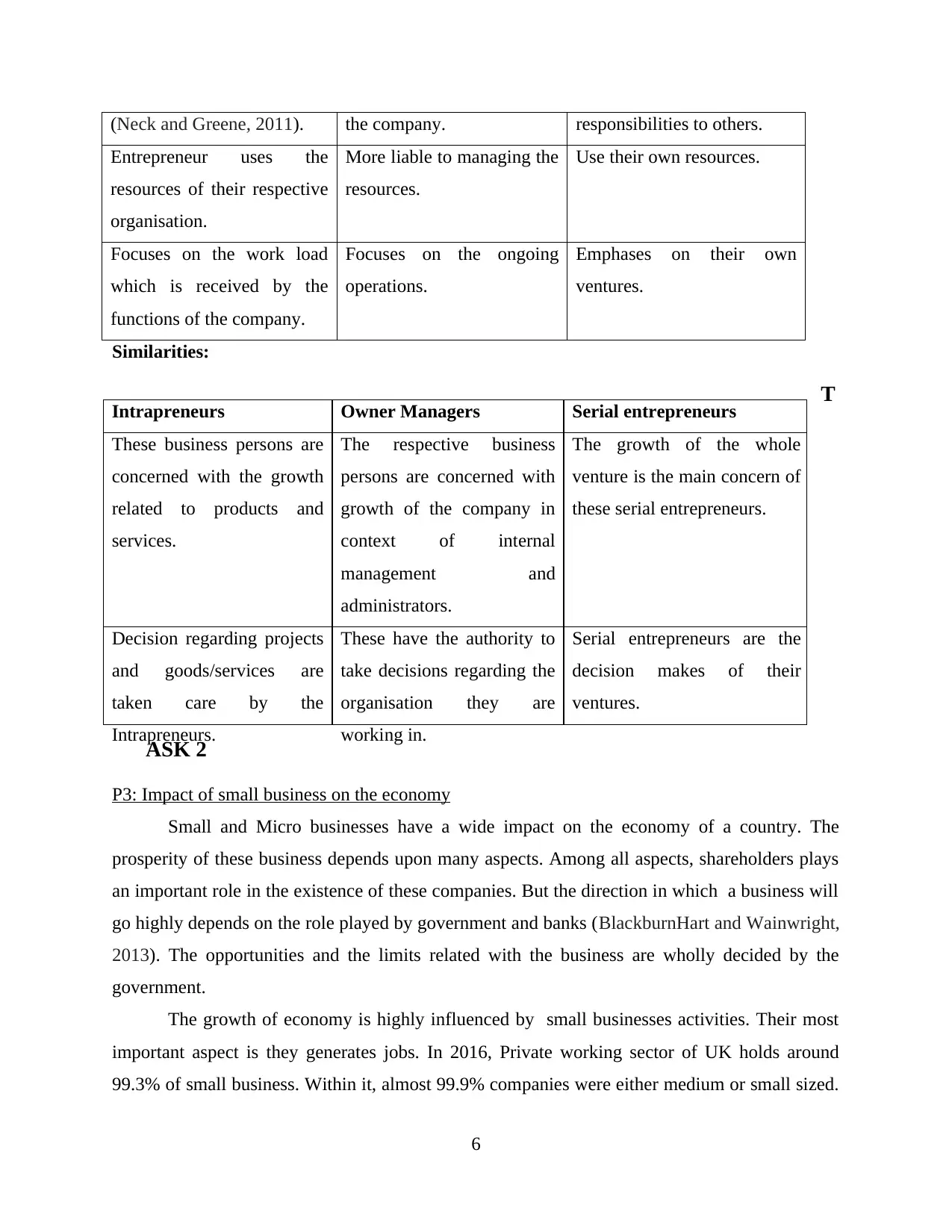
(Neck and Greene, 2011). the company. responsibilities to others.
Entrepreneur uses the
resources of their respective
organisation.
More liable to managing the
resources.
Use their own resources.
Focuses on the work load
which is received by the
functions of the company.
Focuses on the ongoing
operations.
Emphases on their own
ventures.
Similarities:
T
ASK 2
P3: Impact of small business on the economy
Small and Micro businesses have a wide impact on the economy of a country. The
prosperity of these business depends upon many aspects. Among all aspects, shareholders plays
an important role in the existence of these companies. But the direction in which a business will
go highly depends on the role played by government and banks (BlackburnHart and Wainwright,
2013). The opportunities and the limits related with the business are wholly decided by the
government.
The growth of economy is highly influenced by small businesses activities. Their most
important aspect is they generates jobs. In 2016, Private working sector of UK holds around
99.3% of small business. Within it, almost 99.9% companies were either medium or small sized.
6
Intrapreneurs Owner Managers Serial entrepreneurs
These business persons are
concerned with the growth
related to products and
services.
The respective business
persons are concerned with
growth of the company in
context of internal
management and
administrators.
The growth of the whole
venture is the main concern of
these serial entrepreneurs.
Decision regarding projects
and goods/services are
taken care by the
Intrapreneurs.
These have the authority to
take decisions regarding the
organisation they are
working in.
Serial entrepreneurs are the
decision makes of their
ventures.
Entrepreneur uses the
resources of their respective
organisation.
More liable to managing the
resources.
Use their own resources.
Focuses on the work load
which is received by the
functions of the company.
Focuses on the ongoing
operations.
Emphases on their own
ventures.
Similarities:
T
ASK 2
P3: Impact of small business on the economy
Small and Micro businesses have a wide impact on the economy of a country. The
prosperity of these business depends upon many aspects. Among all aspects, shareholders plays
an important role in the existence of these companies. But the direction in which a business will
go highly depends on the role played by government and banks (BlackburnHart and Wainwright,
2013). The opportunities and the limits related with the business are wholly decided by the
government.
The growth of economy is highly influenced by small businesses activities. Their most
important aspect is they generates jobs. In 2016, Private working sector of UK holds around
99.3% of small business. Within it, almost 99.9% companies were either medium or small sized.
6
Intrapreneurs Owner Managers Serial entrepreneurs
These business persons are
concerned with the growth
related to products and
services.
The respective business
persons are concerned with
growth of the company in
context of internal
management and
administrators.
The growth of the whole
venture is the main concern of
these serial entrepreneurs.
Decision regarding projects
and goods/services are
taken care by the
Intrapreneurs.
These have the authority to
take decisions regarding the
organisation they are
working in.
Serial entrepreneurs are the
decision makes of their
ventures.
⊘ This is a preview!⊘
Do you want full access?
Subscribe today to unlock all pages.

Trusted by 1+ million students worldwide
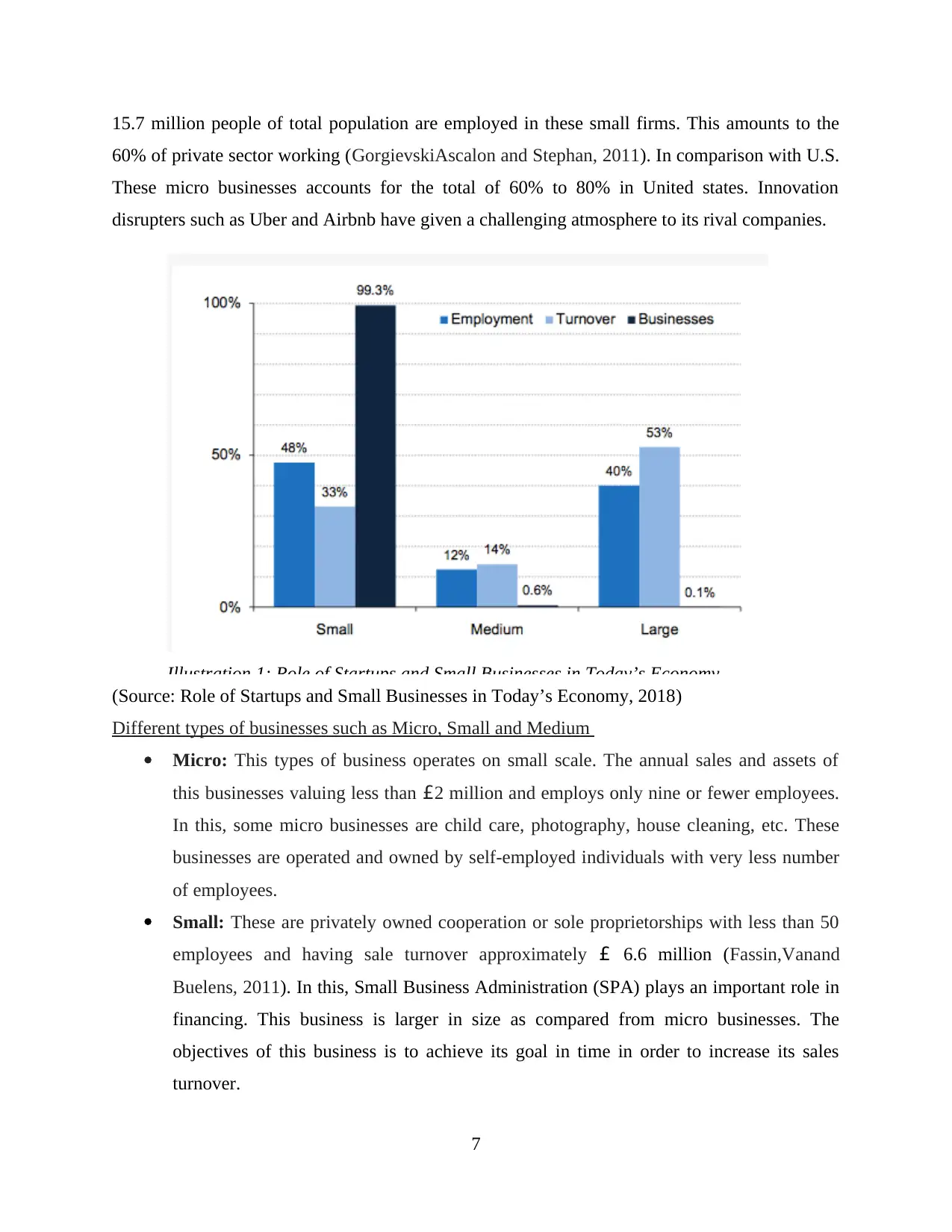
15.7 million people of total population are employed in these small firms. This amounts to the
60% of private sector working (GorgievskiAscalon and Stephan, 2011). In comparison with U.S.
These micro businesses accounts for the total of 60% to 80% in United states. Innovation
disrupters such as Uber and Airbnb have given a challenging atmosphere to its rival companies.
(Source: Role of Startups and Small Businesses in Today’s Economy, 2018)
Different types of businesses such as Micro, Small and Medium
Micro: This types of business operates on small scale. The annual sales and assets of
this businesses valuing less than £2 million and employs only nine or fewer employees.
In this, some micro businesses are child care, photography, house cleaning, etc. These
businesses are operated and owned by self-employed individuals with very less number
of employees.
Small: These are privately owned cooperation or sole proprietorships with less than 50
employees and having sale turnover approximately £ 6.6 million (Fassin,Vanand
Buelens, 2011). In this, Small Business Administration (SPA) plays an important role in
financing. This business is larger in size as compared from micro businesses. The
objectives of this business is to achieve its goal in time in order to increase its sales
turnover.
7
Illustration 1: Role of Startups and Small Businesses in Today’s Economy
60% of private sector working (GorgievskiAscalon and Stephan, 2011). In comparison with U.S.
These micro businesses accounts for the total of 60% to 80% in United states. Innovation
disrupters such as Uber and Airbnb have given a challenging atmosphere to its rival companies.
(Source: Role of Startups and Small Businesses in Today’s Economy, 2018)
Different types of businesses such as Micro, Small and Medium
Micro: This types of business operates on small scale. The annual sales and assets of
this businesses valuing less than £2 million and employs only nine or fewer employees.
In this, some micro businesses are child care, photography, house cleaning, etc. These
businesses are operated and owned by self-employed individuals with very less number
of employees.
Small: These are privately owned cooperation or sole proprietorships with less than 50
employees and having sale turnover approximately £ 6.6 million (Fassin,Vanand
Buelens, 2011). In this, Small Business Administration (SPA) plays an important role in
financing. This business is larger in size as compared from micro businesses. The
objectives of this business is to achieve its goal in time in order to increase its sales
turnover.
7
Illustration 1: Role of Startups and Small Businesses in Today’s Economy
Paraphrase This Document
Need a fresh take? Get an instant paraphrase of this document with our AI Paraphraser
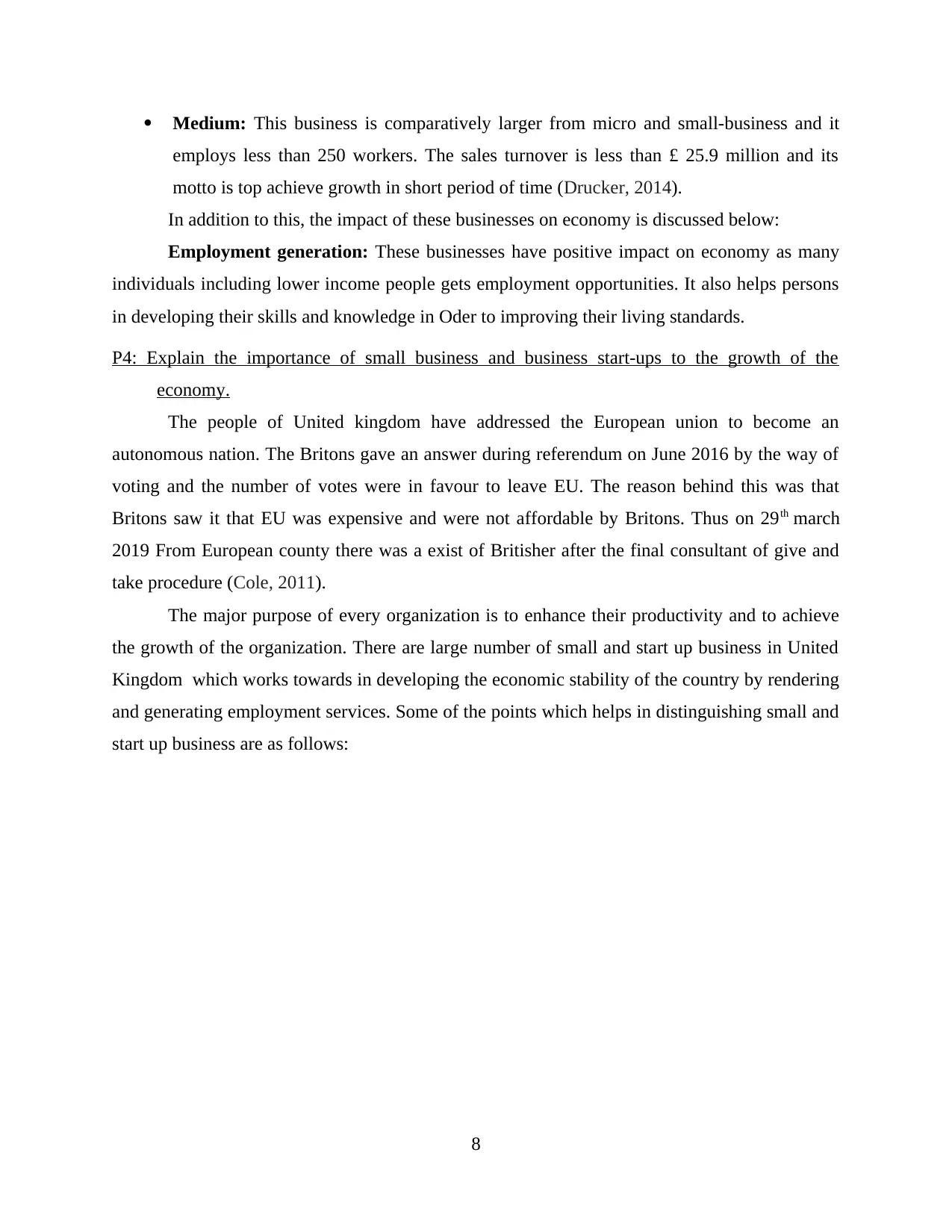
Medium: This business is comparatively larger from micro and small-business and it
employs less than 250 workers. The sales turnover is less than £ 25.9 million and its
motto is top achieve growth in short period of time (Drucker, 2014).
In addition to this, the impact of these businesses on economy is discussed below:
Employment generation: These businesses have positive impact on economy as many
individuals including lower income people gets employment opportunities. It also helps persons
in developing their skills and knowledge in Oder to improving their living standards.
P4: Explain the importance of small business and business start-ups to the growth of the
economy.
The people of United kingdom have addressed the European union to become an
autonomous nation. The Britons gave an answer during referendum on June 2016 by the way of
voting and the number of votes were in favour to leave EU. The reason behind this was that
Britons saw it that EU was expensive and were not affordable by Britons. Thus on 29th march
2019 From European county there was a exist of Britisher after the final consultant of give and
take procedure (Cole, 2011).
The major purpose of every organization is to enhance their productivity and to achieve
the growth of the organization. There are large number of small and start up business in United
Kingdom which works towards in developing the economic stability of the country by rendering
and generating employment services. Some of the points which helps in distinguishing small and
start up business are as follows:
8
employs less than 250 workers. The sales turnover is less than £ 25.9 million and its
motto is top achieve growth in short period of time (Drucker, 2014).
In addition to this, the impact of these businesses on economy is discussed below:
Employment generation: These businesses have positive impact on economy as many
individuals including lower income people gets employment opportunities. It also helps persons
in developing their skills and knowledge in Oder to improving their living standards.
P4: Explain the importance of small business and business start-ups to the growth of the
economy.
The people of United kingdom have addressed the European union to become an
autonomous nation. The Britons gave an answer during referendum on June 2016 by the way of
voting and the number of votes were in favour to leave EU. The reason behind this was that
Britons saw it that EU was expensive and were not affordable by Britons. Thus on 29th march
2019 From European county there was a exist of Britisher after the final consultant of give and
take procedure (Cole, 2011).
The major purpose of every organization is to enhance their productivity and to achieve
the growth of the organization. There are large number of small and start up business in United
Kingdom which works towards in developing the economic stability of the country by rendering
and generating employment services. Some of the points which helps in distinguishing small and
start up business are as follows:
8
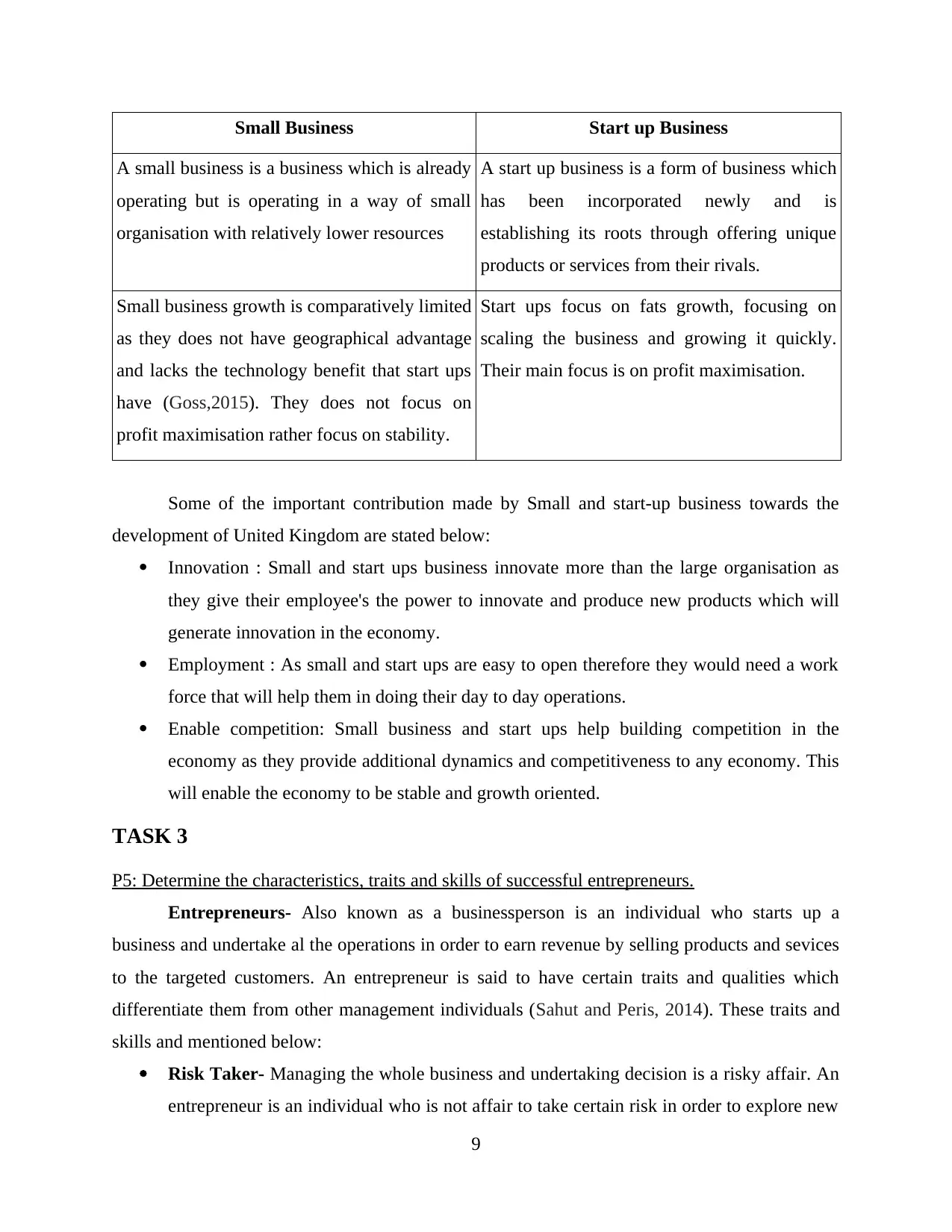
Small Business Start up Business
A small business is a business which is already
operating but is operating in a way of small
organisation with relatively lower resources
A start up business is a form of business which
has been incorporated newly and is
establishing its roots through offering unique
products or services from their rivals.
Small business growth is comparatively limited
as they does not have geographical advantage
and lacks the technology benefit that start ups
have (Goss,2015). They does not focus on
profit maximisation rather focus on stability.
Start ups focus on fats growth, focusing on
scaling the business and growing it quickly.
Their main focus is on profit maximisation.
Some of the important contribution made by Small and start-up business towards the
development of United Kingdom are stated below:
Innovation : Small and start ups business innovate more than the large organisation as
they give their employee's the power to innovate and produce new products which will
generate innovation in the economy.
Employment : As small and start ups are easy to open therefore they would need a work
force that will help them in doing their day to day operations.
Enable competition: Small business and start ups help building competition in the
economy as they provide additional dynamics and competitiveness to any economy. This
will enable the economy to be stable and growth oriented.
TASK 3
P5: Determine the characteristics, traits and skills of successful entrepreneurs.
Entrepreneurs- Also known as a businessperson is an individual who starts up a
business and undertake al the operations in order to earn revenue by selling products and sevices
to the targeted customers. An entrepreneur is said to have certain traits and qualities which
differentiate them from other management individuals (Sahut and Peris, 2014). These traits and
skills and mentioned below:
Risk Taker- Managing the whole business and undertaking decision is a risky affair. An
entrepreneur is an individual who is not affair to take certain risk in order to explore new
9
A small business is a business which is already
operating but is operating in a way of small
organisation with relatively lower resources
A start up business is a form of business which
has been incorporated newly and is
establishing its roots through offering unique
products or services from their rivals.
Small business growth is comparatively limited
as they does not have geographical advantage
and lacks the technology benefit that start ups
have (Goss,2015). They does not focus on
profit maximisation rather focus on stability.
Start ups focus on fats growth, focusing on
scaling the business and growing it quickly.
Their main focus is on profit maximisation.
Some of the important contribution made by Small and start-up business towards the
development of United Kingdom are stated below:
Innovation : Small and start ups business innovate more than the large organisation as
they give their employee's the power to innovate and produce new products which will
generate innovation in the economy.
Employment : As small and start ups are easy to open therefore they would need a work
force that will help them in doing their day to day operations.
Enable competition: Small business and start ups help building competition in the
economy as they provide additional dynamics and competitiveness to any economy. This
will enable the economy to be stable and growth oriented.
TASK 3
P5: Determine the characteristics, traits and skills of successful entrepreneurs.
Entrepreneurs- Also known as a businessperson is an individual who starts up a
business and undertake al the operations in order to earn revenue by selling products and sevices
to the targeted customers. An entrepreneur is said to have certain traits and qualities which
differentiate them from other management individuals (Sahut and Peris, 2014). These traits and
skills and mentioned below:
Risk Taker- Managing the whole business and undertaking decision is a risky affair. An
entrepreneur is an individual who is not affair to take certain risk in order to explore new
9
⊘ This is a preview!⊘
Do you want full access?
Subscribe today to unlock all pages.

Trusted by 1+ million students worldwide
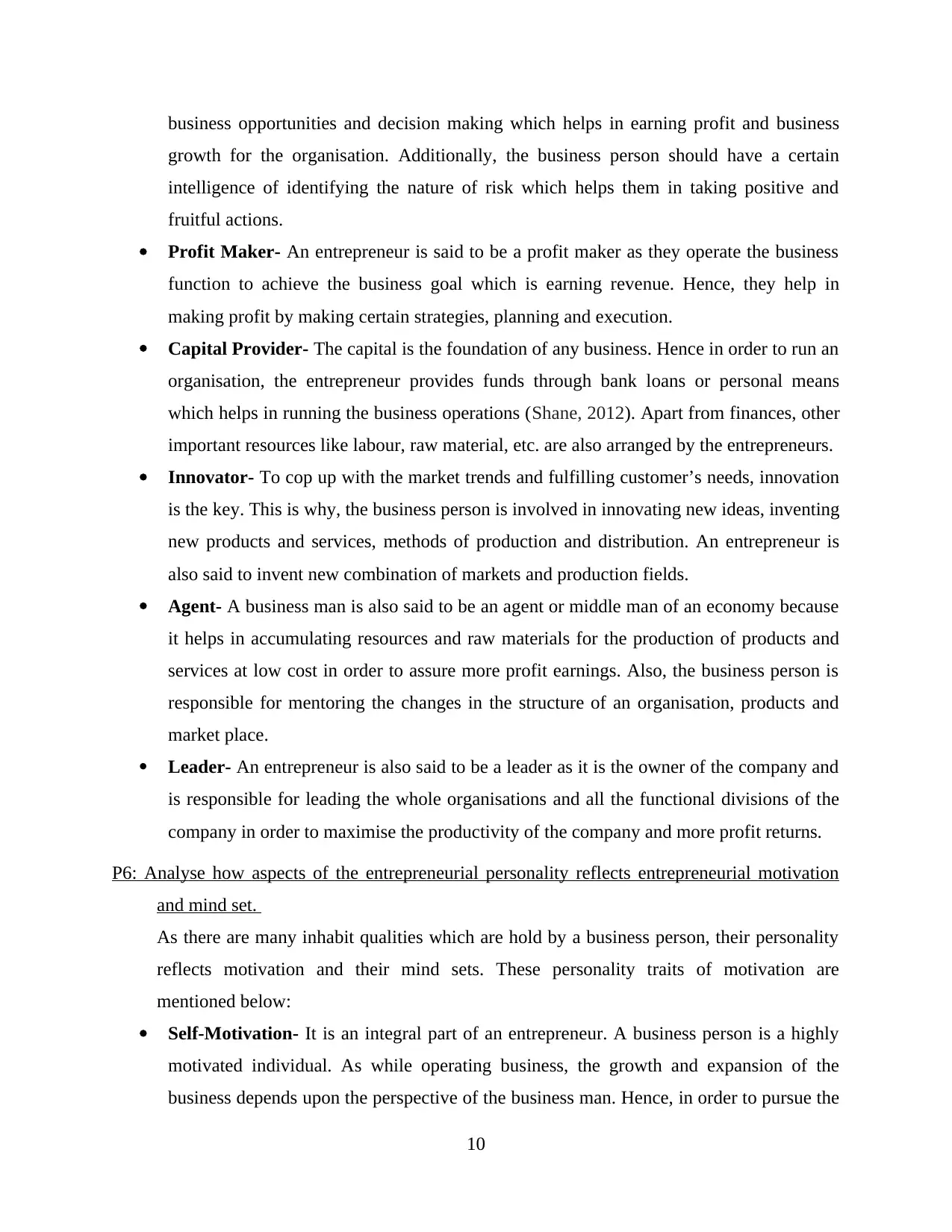
business opportunities and decision making which helps in earning profit and business
growth for the organisation. Additionally, the business person should have a certain
intelligence of identifying the nature of risk which helps them in taking positive and
fruitful actions.
Profit Maker- An entrepreneur is said to be a profit maker as they operate the business
function to achieve the business goal which is earning revenue. Hence, they help in
making profit by making certain strategies, planning and execution.
Capital Provider- The capital is the foundation of any business. Hence in order to run an
organisation, the entrepreneur provides funds through bank loans or personal means
which helps in running the business operations (Shane, 2012). Apart from finances, other
important resources like labour, raw material, etc. are also arranged by the entrepreneurs.
Innovator- To cop up with the market trends and fulfilling customer’s needs, innovation
is the key. This is why, the business person is involved in innovating new ideas, inventing
new products and services, methods of production and distribution. An entrepreneur is
also said to invent new combination of markets and production fields.
Agent- A business man is also said to be an agent or middle man of an economy because
it helps in accumulating resources and raw materials for the production of products and
services at low cost in order to assure more profit earnings. Also, the business person is
responsible for mentoring the changes in the structure of an organisation, products and
market place.
Leader- An entrepreneur is also said to be a leader as it is the owner of the company and
is responsible for leading the whole organisations and all the functional divisions of the
company in order to maximise the productivity of the company and more profit returns.
P6: Analyse how aspects of the entrepreneurial personality reflects entrepreneurial motivation
and mind set.
As there are many inhabit qualities which are hold by a business person, their personality
reflects motivation and their mind sets. These personality traits of motivation are
mentioned below:
Self-Motivation- It is an integral part of an entrepreneur. A business person is a highly
motivated individual. As while operating business, the growth and expansion of the
business depends upon the perspective of the business man. Hence, in order to pursue the
10
growth for the organisation. Additionally, the business person should have a certain
intelligence of identifying the nature of risk which helps them in taking positive and
fruitful actions.
Profit Maker- An entrepreneur is said to be a profit maker as they operate the business
function to achieve the business goal which is earning revenue. Hence, they help in
making profit by making certain strategies, planning and execution.
Capital Provider- The capital is the foundation of any business. Hence in order to run an
organisation, the entrepreneur provides funds through bank loans or personal means
which helps in running the business operations (Shane, 2012). Apart from finances, other
important resources like labour, raw material, etc. are also arranged by the entrepreneurs.
Innovator- To cop up with the market trends and fulfilling customer’s needs, innovation
is the key. This is why, the business person is involved in innovating new ideas, inventing
new products and services, methods of production and distribution. An entrepreneur is
also said to invent new combination of markets and production fields.
Agent- A business man is also said to be an agent or middle man of an economy because
it helps in accumulating resources and raw materials for the production of products and
services at low cost in order to assure more profit earnings. Also, the business person is
responsible for mentoring the changes in the structure of an organisation, products and
market place.
Leader- An entrepreneur is also said to be a leader as it is the owner of the company and
is responsible for leading the whole organisations and all the functional divisions of the
company in order to maximise the productivity of the company and more profit returns.
P6: Analyse how aspects of the entrepreneurial personality reflects entrepreneurial motivation
and mind set.
As there are many inhabit qualities which are hold by a business person, their personality
reflects motivation and their mind sets. These personality traits of motivation are
mentioned below:
Self-Motivation- It is an integral part of an entrepreneur. A business person is a highly
motivated individual. As while operating business, the growth and expansion of the
business depends upon the perspective of the business man. Hence, in order to pursue the
10
Paraphrase This Document
Need a fresh take? Get an instant paraphrase of this document with our AI Paraphraser
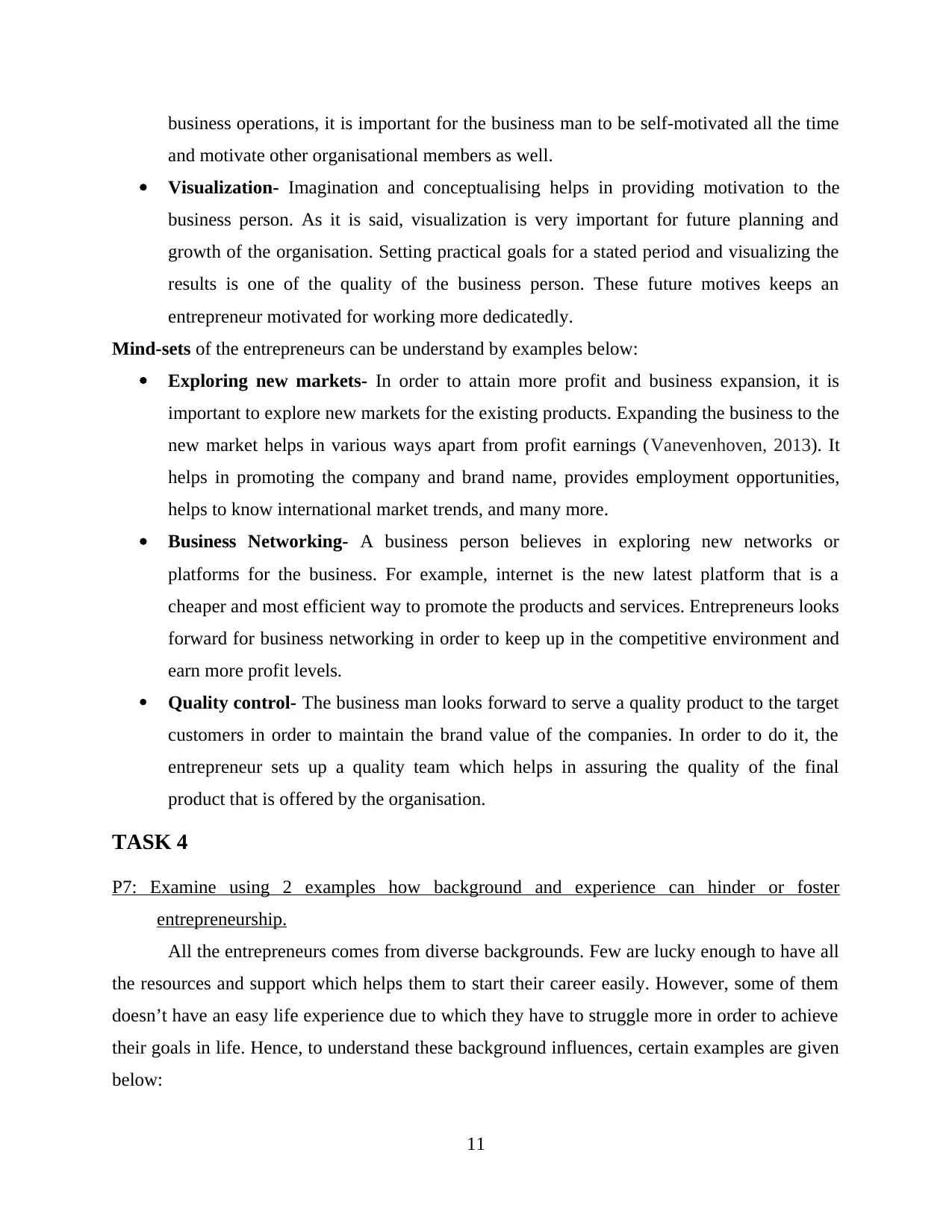
business operations, it is important for the business man to be self-motivated all the time
and motivate other organisational members as well.
Visualization- Imagination and conceptualising helps in providing motivation to the
business person. As it is said, visualization is very important for future planning and
growth of the organisation. Setting practical goals for a stated period and visualizing the
results is one of the quality of the business person. These future motives keeps an
entrepreneur motivated for working more dedicatedly.
Mind-sets of the entrepreneurs can be understand by examples below:
Exploring new markets- In order to attain more profit and business expansion, it is
important to explore new markets for the existing products. Expanding the business to the
new market helps in various ways apart from profit earnings (Vanevenhoven, 2013). It
helps in promoting the company and brand name, provides employment opportunities,
helps to know international market trends, and many more.
Business Networking- A business person believes in exploring new networks or
platforms for the business. For example, internet is the new latest platform that is a
cheaper and most efficient way to promote the products and services. Entrepreneurs looks
forward for business networking in order to keep up in the competitive environment and
earn more profit levels.
Quality control- The business man looks forward to serve a quality product to the target
customers in order to maintain the brand value of the companies. In order to do it, the
entrepreneur sets up a quality team which helps in assuring the quality of the final
product that is offered by the organisation.
TASK 4
P7: Examine using 2 examples how background and experience can hinder or foster
entrepreneurship.
All the entrepreneurs comes from diverse backgrounds. Few are lucky enough to have all
the resources and support which helps them to start their career easily. However, some of them
doesn’t have an easy life experience due to which they have to struggle more in order to achieve
their goals in life. Hence, to understand these background influences, certain examples are given
below:
11
and motivate other organisational members as well.
Visualization- Imagination and conceptualising helps in providing motivation to the
business person. As it is said, visualization is very important for future planning and
growth of the organisation. Setting practical goals for a stated period and visualizing the
results is one of the quality of the business person. These future motives keeps an
entrepreneur motivated for working more dedicatedly.
Mind-sets of the entrepreneurs can be understand by examples below:
Exploring new markets- In order to attain more profit and business expansion, it is
important to explore new markets for the existing products. Expanding the business to the
new market helps in various ways apart from profit earnings (Vanevenhoven, 2013). It
helps in promoting the company and brand name, provides employment opportunities,
helps to know international market trends, and many more.
Business Networking- A business person believes in exploring new networks or
platforms for the business. For example, internet is the new latest platform that is a
cheaper and most efficient way to promote the products and services. Entrepreneurs looks
forward for business networking in order to keep up in the competitive environment and
earn more profit levels.
Quality control- The business man looks forward to serve a quality product to the target
customers in order to maintain the brand value of the companies. In order to do it, the
entrepreneur sets up a quality team which helps in assuring the quality of the final
product that is offered by the organisation.
TASK 4
P7: Examine using 2 examples how background and experience can hinder or foster
entrepreneurship.
All the entrepreneurs comes from diverse backgrounds. Few are lucky enough to have all
the resources and support which helps them to start their career easily. However, some of them
doesn’t have an easy life experience due to which they have to struggle more in order to achieve
their goals in life. Hence, to understand these background influences, certain examples are given
below:
11
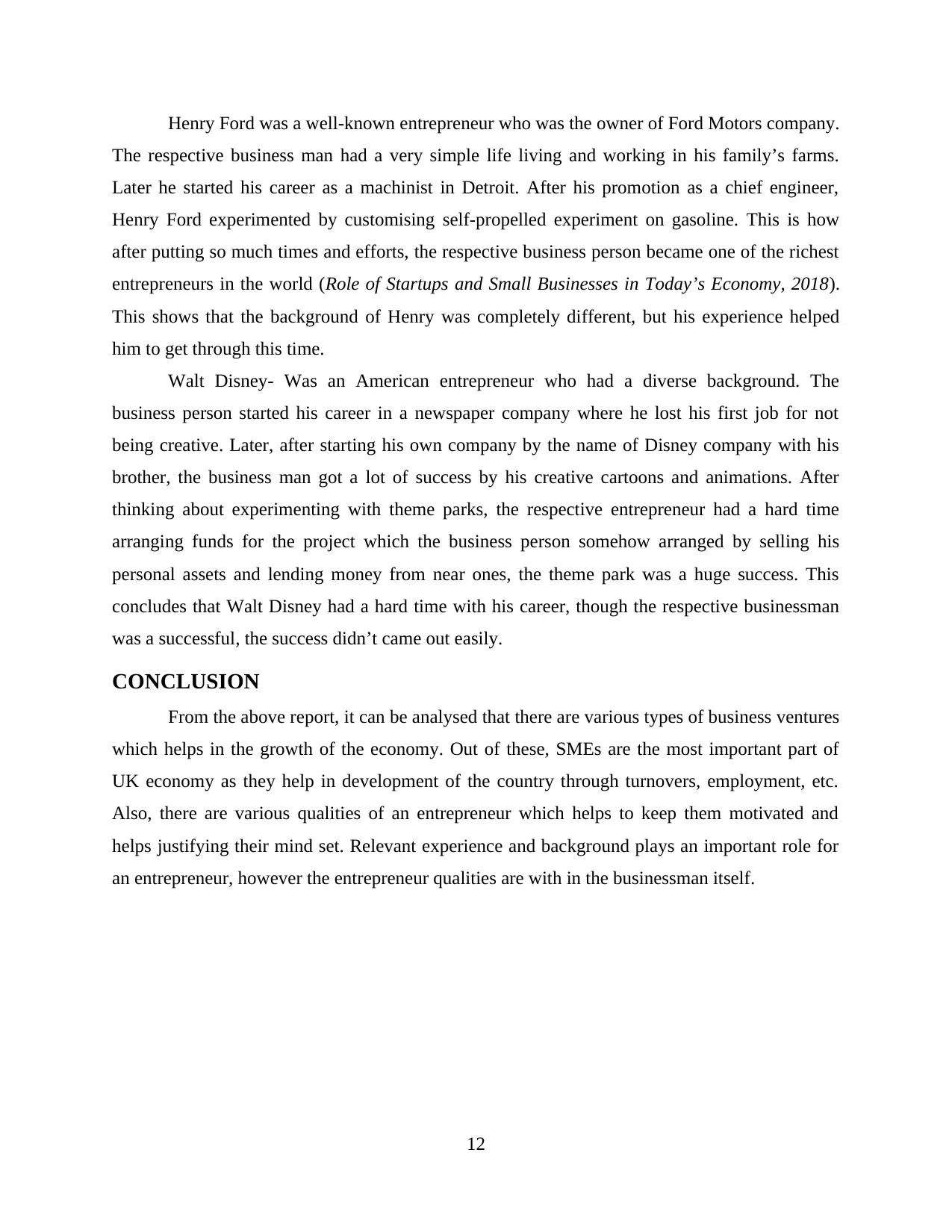
Henry Ford was a well-known entrepreneur who was the owner of Ford Motors company.
The respective business man had a very simple life living and working in his family’s farms.
Later he started his career as a machinist in Detroit. After his promotion as a chief engineer,
Henry Ford experimented by customising self-propelled experiment on gasoline. This is how
after putting so much times and efforts, the respective business person became one of the richest
entrepreneurs in the world (Role of Startups and Small Businesses in Today’s Economy, 2018).
This shows that the background of Henry was completely different, but his experience helped
him to get through this time.
Walt Disney- Was an American entrepreneur who had a diverse background. The
business person started his career in a newspaper company where he lost his first job for not
being creative. Later, after starting his own company by the name of Disney company with his
brother, the business man got a lot of success by his creative cartoons and animations. After
thinking about experimenting with theme parks, the respective entrepreneur had a hard time
arranging funds for the project which the business person somehow arranged by selling his
personal assets and lending money from near ones, the theme park was a huge success. This
concludes that Walt Disney had a hard time with his career, though the respective businessman
was a successful, the success didn’t came out easily.
CONCLUSION
From the above report, it can be analysed that there are various types of business ventures
which helps in the growth of the economy. Out of these, SMEs are the most important part of
UK economy as they help in development of the country through turnovers, employment, etc.
Also, there are various qualities of an entrepreneur which helps to keep them motivated and
helps justifying their mind set. Relevant experience and background plays an important role for
an entrepreneur, however the entrepreneur qualities are with in the businessman itself.
12
The respective business man had a very simple life living and working in his family’s farms.
Later he started his career as a machinist in Detroit. After his promotion as a chief engineer,
Henry Ford experimented by customising self-propelled experiment on gasoline. This is how
after putting so much times and efforts, the respective business person became one of the richest
entrepreneurs in the world (Role of Startups and Small Businesses in Today’s Economy, 2018).
This shows that the background of Henry was completely different, but his experience helped
him to get through this time.
Walt Disney- Was an American entrepreneur who had a diverse background. The
business person started his career in a newspaper company where he lost his first job for not
being creative. Later, after starting his own company by the name of Disney company with his
brother, the business man got a lot of success by his creative cartoons and animations. After
thinking about experimenting with theme parks, the respective entrepreneur had a hard time
arranging funds for the project which the business person somehow arranged by selling his
personal assets and lending money from near ones, the theme park was a huge success. This
concludes that Walt Disney had a hard time with his career, though the respective businessman
was a successful, the success didn’t came out easily.
CONCLUSION
From the above report, it can be analysed that there are various types of business ventures
which helps in the growth of the economy. Out of these, SMEs are the most important part of
UK economy as they help in development of the country through turnovers, employment, etc.
Also, there are various qualities of an entrepreneur which helps to keep them motivated and
helps justifying their mind set. Relevant experience and background plays an important role for
an entrepreneur, however the entrepreneur qualities are with in the businessman itself.
12
⊘ This is a preview!⊘
Do you want full access?
Subscribe today to unlock all pages.

Trusted by 1+ million students worldwide
1 out of 13
Related Documents
Your All-in-One AI-Powered Toolkit for Academic Success.
+13062052269
info@desklib.com
Available 24*7 on WhatsApp / Email
![[object Object]](/_next/static/media/star-bottom.7253800d.svg)
Unlock your academic potential
Copyright © 2020–2026 A2Z Services. All Rights Reserved. Developed and managed by ZUCOL.





